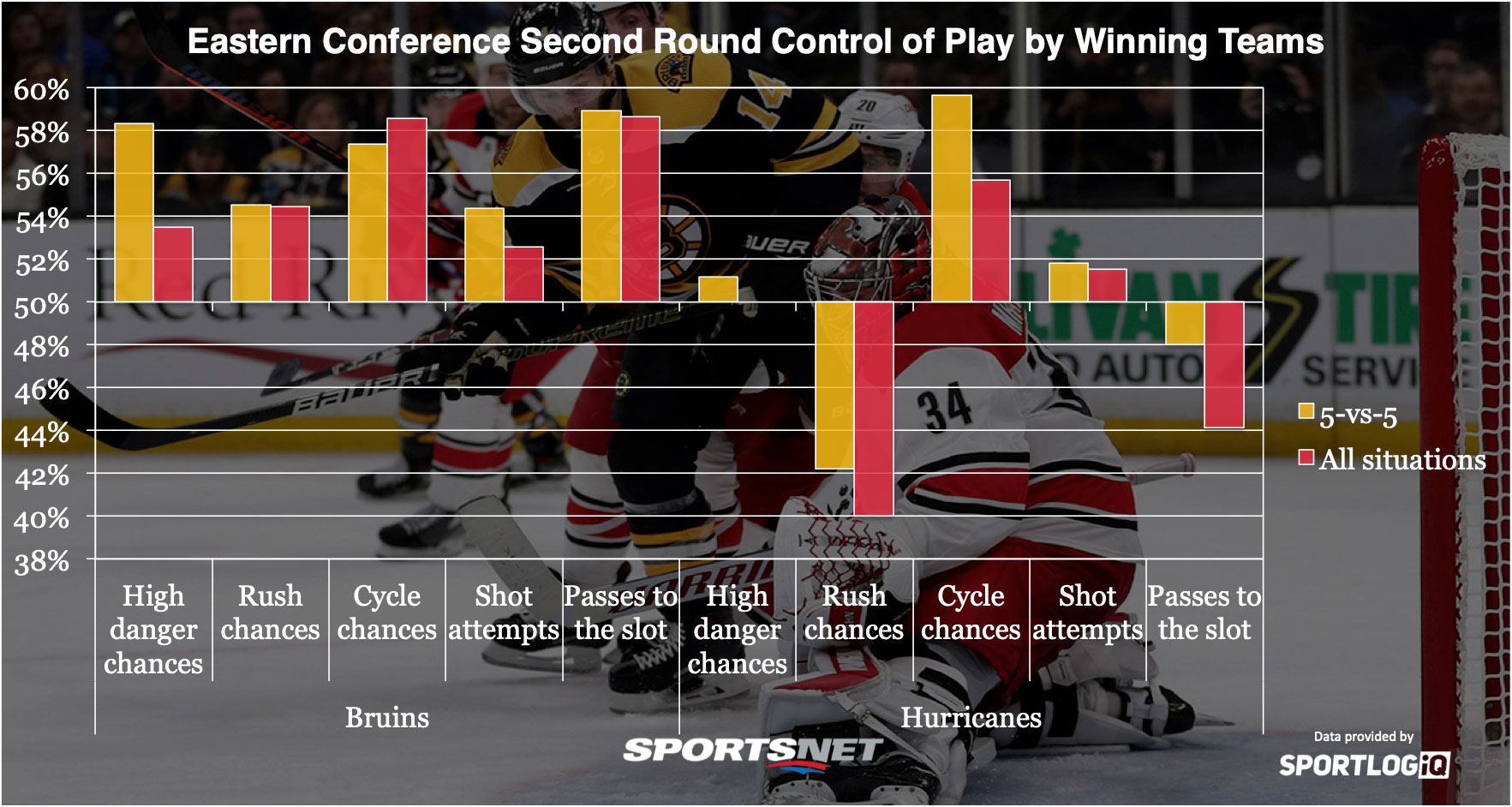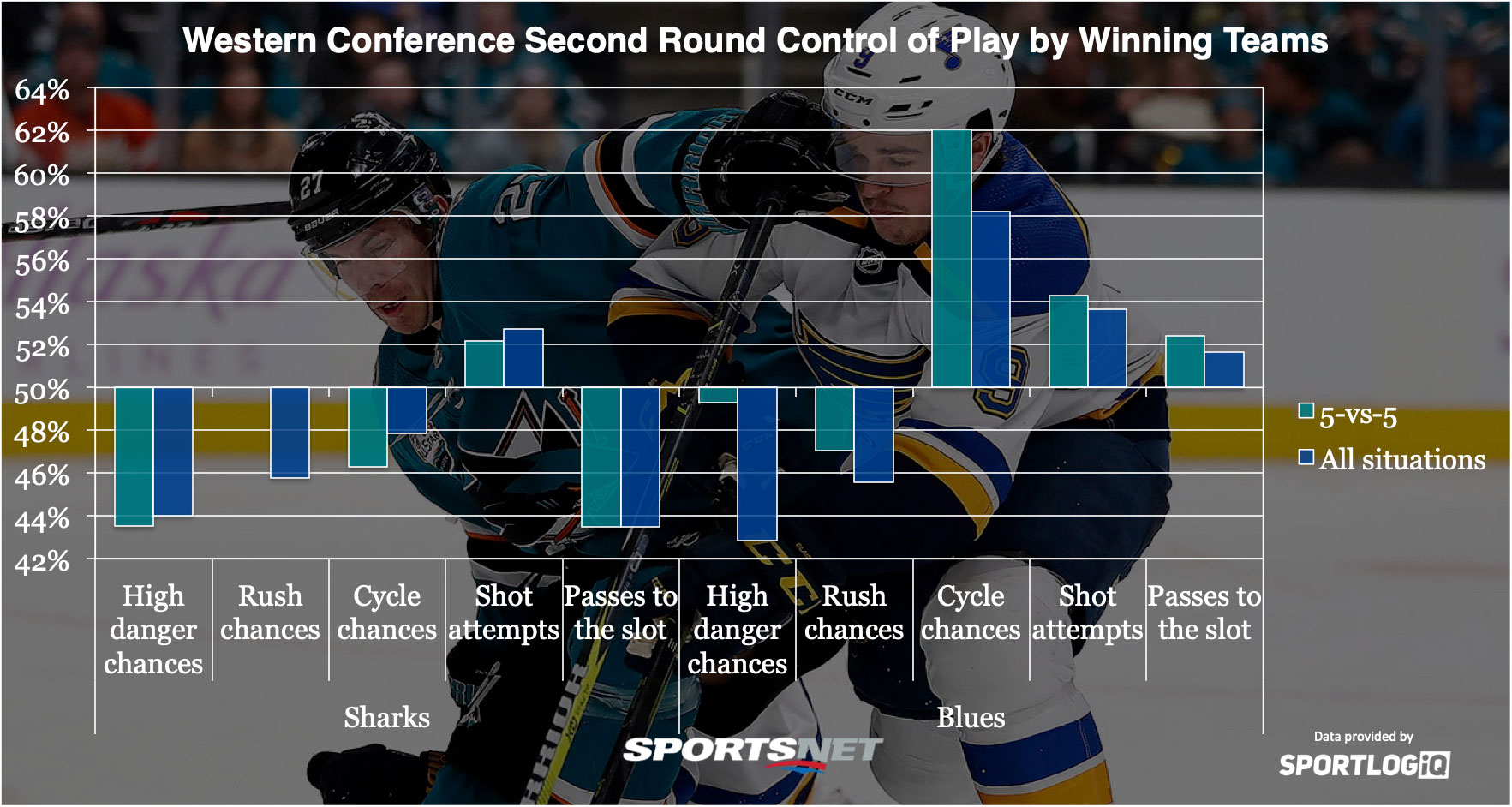The NHL’s Conference Finals have already begun, but let’s take a few moments to recap how we got here and look forward to what’s to come, similar to what we did in the last edition of Truth by Numbers for the first round.
Let’s start with the Eastern Conference.

The Boston Bruins have already managed to take the advantage in their series with the Carolina Hurricanes with a comeback win in Game 1 thanks to capitalizing twice on a trio of penalties in the third period that managed to erase a one-goal lead and create one of their own.
Looking at how each team played in the last round, the Hurricanes swept the Islanders but the series was much closer in detail than it ended up being in results. The Islanders wildly outchanced the Hurricanes off the rush, and controlled the passes to the slot, similar to what Washington did to Carolina in the first round, while the Hurricanes were slightly better at getting high-danger chances, and pounded the Islanders off the cycle.
The Bruins, meanwhile, took six games to drop the Columbus Blue Jackets, but heavily outplayed them everywhere. What makes the Bruins such a dangerous team is that they aren’t stuck to one style of play — they aren’t just a rush team or just a cycle team, or just a forechecking team. They do everything well, eventually overwhelming opponents.
One issue for the Hurricanes against the Bruins is going to be controlling passing plays, something that has been a weakness for them all playoffs and has been a particular strength of the Bruins for the better part of a decade now.
One thing that will be interesting to watch in this series will be special teams. Against the Maple Leafs, the Bruins’ were a gigantic advantage, whereas the Blue Jackets actually managed to cut into the Bruins on special teams a little bit, cutting their advantages in high-danger chances, shot attempts, and passes to the slot.
After Game 1, it didn’t look like the Hurricanes were fully prepared for the voracious power play the Bruins deploy, and Carolina has been primarily a strong even-strength team all playoffs long. So, can special teams be the difference in the series?
What about the West?

For the second straight series, the San Jose Sharks have prevailed in seven games, despite being pretty heavily outplayed by most metrics against the Vegas Golden Knights and now the Colorado Avalanche.
It’s not like the Sharks are a bad team. They were absolutely dominant at even strength, but the Golden Knights were better, and the Avalanche in the playoffs are just… not of this earth. The Avs’ preparation heading into a series is out of this world good, as I’ve looked into earlier this post-season, but even outplaying the Sharks just wasn’t enough this time.
Surprisingly, after the worst regular season of his career, you could make a good argument that Martin Jones has been one of the most important players on the Sharks’ roster. They haven’t done a good job insulating him from quality shots at all, and while his overall save percentage isn’t great, he was excellent against the Avalanche.
In five of the seven games in round two, Jones posted a save percentage of .926 or better, and when your goaltender is able to do that despite your defence being relatively porous, you’ve got a pretty good chance at winning if you can get some opportunistic scoring. But it’s probably not a good idea for long-term success.
The Blues, on the other hand, went from playing an extremely tight series against the Winnipeg Jets, by every measure, to another tight series against the Dallas Stars that had some wider disparities in certain areas of gameplay.
The Stars were able to cut the Blues up off the rush, and their incredible defensive control of the inner slot area, especially on special teams, led to a large advantage in high-danger chances overall, while the Blues controlled the overall shot volume and exerted unbelievably impressive control of the cycle game, getting over 62 per cent of the chances off the cycle in the series at 5-vs-5.
With both teams playing seven games in Round 2, there’s no talk of one team being more rested than the other, and there’s not a lot of time for either coaching staff to prepare for this one, so we should get some fun twists and turns as the series goes on and the teams adjust to each other.
While the Sharks haven’t dominated either of their opponents in the playoffs so far, both the Golden Knights and Avalanche were amazing teams at attacking off the rush, and the Sharks were pretty good at generating counterattacks the same way, especially at even strength.
The biggest weakness the Blues have defensively is defending off the rush, so while the Sharks may not have a reputation as a fast team, they can create chances off the rush, which is an area to watch in this one.
[relatedlinks]
BUY OR SELL
• When Joe Pavelski was hurt in Game 7 against the Golden Knights, you had to wonder how the Sharks would weather that loss. The answer has been a huge step up from Logan Couture. For a long time, Couture was one of the ‘young Sharks’ on an older team — now he’s a 30-year-old vet leading the way. Of forwards left in the playoffs, only Timo Meier and Patrice Bergeron have created more scoring chances per 20 minutes at 5-vs-5 than he has.
• The enduring storyline for the Sharks in recent years has been to finally get Jumbo Joe Thornton a Cup, but at 39 years old, he’s not just a greybeard trying to hang onto a role, he’s still a key player. Only Meier and Couture have created more scoring chances for the Sharks than Thornton has.
• How big of a payoff has it been for Boston to bring in Charlie Coyle? It seems like every goal he scores is a key one, even the empty-net ones, and while he’s on the ice the Bruins have controlled 67 per cent of the high-danger scoring chances. The Bruins depth has been massive in the playoffs, because their top line has been uncharacteristically exploitable defensively. The Bruin who’s been on the ice for the most high-danger chances-against per minute in the playoffs? Brad Marchand.
• Jordan Staal took a bad penalty that turned the tide against the Canes in Game 1, but he’s going to be a key in that series. Staal has always been an analytics darling, but his performance in these playoffs might be his best ever. While he’s on the ice, the Hurricanes are controlling 72 per cent of the high-danger chances, 60 per cent of the passes to the slot, and 61 per cent of the shot attempts. That’s beastly.








